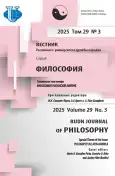The Worldview of Rudolf Steiner
- Авторлар: Matyushova M.P.1
-
Мекемелер:
- RUDN University
- Шығарылым: Том 29, № 3 (2025): PHILOSOPHY IN LATIN AMERICA
- Беттер: 860-875
- Бөлім: HISTORY OF PHILOSOPHY
- URL: https://journal-vniispk.ru/2313-2302/article/view/325479
- DOI: https://doi.org/10.22363/2313-2302-2025-29-3-860-875
- EDN: https://elibrary.ru/EFSTUK
- ID: 325479
Дәйексөз келтіру
Толық мәтін
Аннотация
The study delves into the process of formation of the worldview of Rudolf Steiner, a thinker who rightfully earned the title "Homo universalis" at the turn of the XIX and XX centuries. There is a complex connection between the influences that shaped his intellectual baggage: from the philosophy of Eduard von Hartmann’s pessimism and the ethical idealism of Johann Gottlieb Fichte to the dialectics of Georg Wilhelm Friedrich Hegel. A special place in the study is occupied by the analysis of Johann Wolfgang Goethe’s teaching on color, which became a cornerstone in the formation of the Steiner worldview. Inspired by the genius of the great poet, Steiner develops his ideas about the profound effect of color on the human psyche, on the train of thought, modes of behavior and shades of mood. This impulse leads to the creation of an original aesthetic, a special vision of the essence of art and its role in public life. Art appears as an extension of nature, but carried out by more sublime means. All this becomes the foundation for building a unique concept of the spiritual and cultural evolution of mankind, in which man is thought of as an inseparable unity of the physical and spiritual, sensual and supersensible worlds. The article also examines the echo of R. Steiner’s ideas in Russian culture and analyzes the key principles of Waldorf pedagogy.
Авторлар туралы
Maria Matyushova
RUDN University
Хат алмасуға жауапты Автор.
Email: maria_matushova@mail.ru
ORCID iD: 0000-0003-0585-8412
SPIN-код: 4411-0855
CSc in Philosophy, Associate Professor of the Department of Ontology and Theory of Knowledge, Faculty of Humanities and Social Sciences
6 Miklukho-Maklaya St., Moscow, 117198, Russian FederationӘдебиет тізімі
- Schmitt A. The concept of Andrei Bely’s “self-conscious soul”: a synthesis of Kant’s early Reception with Steiner’s teaching and esoteric Practice. RUDN Journal of Philosophy. 2020;24(2):201–218. https://doi.org/10.22363/2313-2302-2020-24-2-201-218
- Steiner R. “The social future”: Six reports and answers to questions. Zurich, from October 24 to October 30, 1919. Kaluga: Spiritual knowledge publ.; 1993.
- Steiner R. My life path. GA 028 Unfinished autobiography, published by Maria Steiner in 1925. Available from: http://bdn-steiner.ru/modules.php?name=Steiner&go= page&pid=28 (accessed: 10.02.2025).
- Steiner R. Spiritual studies. An introduction to the supersensible knowledge of the world and the purpose of man. Dornach: Philosophical and Anthroposophical publ.; 1927.
- Steiner R. From the field of spiritual knowledge or Anthroposophy. Moscow: Enigma; 1997.
- Steiner R. Goethe as the father of the new aesthetics. From GA 030. Available from: http://bdn-steiner.ru/modules.php?name=Steiner&go=page&pid=030 (accessed: 10.02.2025).
- Goethe J. The doctrine of color. Available from: https://libcat.ru/knigi/nauka-i-obrazovanie/fizika/87956-2-iogann-gyote-uchenie-o-cvete-teoriya-poznaniya.html#text (accessed: 10.02.2025).
- Eckerman JP. Conversations with Goethe in the last years of his life. Yerevan: Hayastan; 1988.
- Kanenga AK. Theosophical and anthroposophical ideas in Russian art. Available from: https://nowimir.ru/DATA/060000_1.htm (accessed: 10.02.2025).
- Steiner R. The general doctrine of man as the basis of pedagogy GA 293 A training course of lectures for teachers of the Free Waldorf School, delivered on 21 VIII–IX 1919 in Stuttgart. Moscow: Parsifal. Available from: https://textarchive.ru/c-1609364-pall.html (accessed: 10.02.2025).
- Zhemchuzhnikova MN. Memoirs of the Moscow Anthroposophical Society. In: Almanac “The Past” 1989. № 6. Available from: http://bdn-steiner.ru/modules/Books/ files/6701.pdf (accessed: 10.02.2025).
- Steiner R. Art and the knowledge of art. The foundations of a new aesthetics. Abstract 1888. Four articles in 1890 and 1898 and eight lectures delivered between 1909 and 1921. Dornach, 1985.
Қосымша файлдар









